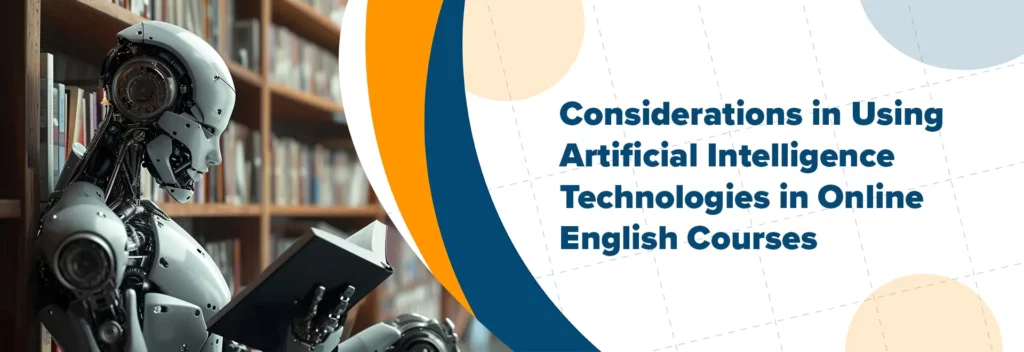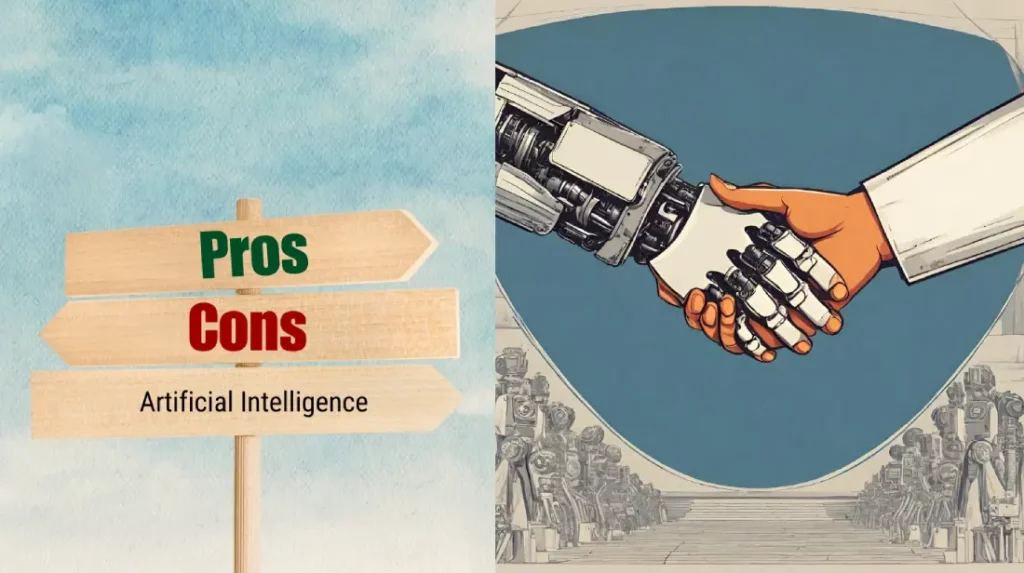
10 Thought-Provoking Pros and Cons: Considerations in Using Artificial Intelligence Technologies in Online English Courses
Introduction
As technology advances to its Fourth Industrial Revolution or 4IR, many Artificial Intelligence Technologies have been born and evolved. Due to the booming of advanced technologies, some people conform to the needs and demands of society, especially the use of Artificial Intelligence in different fields.
Long ago, artificial intelligence was once considered science fiction. However, nowadays, it has become part of the real world. A lot of people use artificial intelligence for various purposes in their lives. Thus, this creative innovation can lead to multiple challenges ahead if fallen into the wrong hands. Especially in the field of Education; particularly in teaching and learning another language.
Brief History of Artificial Intelligence
The first Artificial Intelligence Technology was a computing machine designed by Alan Mathison Turing, a pioneer of this innovation, in the mid-20th century. However, in late 2022, it became a software application, ChatGPT, that can easily be accessed through one’s mobile phone or computer with just one click. It has become a partner in human’s daily endeavors now. Moreover, ChatGPT was created by an AI research company, Open AI, with Sam Altman. This application passed the Turing test, as it was stated to be a language model.
Crucially, this innovation has led to many issues concerning the use of Artificial Intelligence in Education. Whereby, the development of the student’s learning progress in learning a new language is affected because it can have an adverse effect, either positive or negative. Below are the pros and cons of using Artificial Intelligence Technologies in learning English to be considered.

Pros and Cons of Using Artificial Intelligence Technologies to Learn English
It is important to note that every innovation has positive and negative sides. Proper netiquette must be highlighted for students to be guided in using these innovations. However, it is not just Chat GPT, there are other Artificial Intelligence over the internet nowadays that can generate images, videos, facial edits, and many more. Moreover, recent research has also proposed many benefits and drawbacks to be discussed. It can either be a friend or a foe.
Artificial Intelligence Technologies as a FRIEND
There are a lot of advantages that Artificial Intelligence Technologies bring to humans in many different ways. Below are the Pros of using Artificial Intelligence Technologies in Online English Learning:
- Saves Time and Effort
Using Artificial Intelligence Technologies can help you save time, especially when organizing lots of information in the English language. This can also help students feel at ease when thinking about difficult concepts because it quickly generates the information needed for assignments, projects, workloads, etc. For example, Shane is a part-time student with 10 papers to read to make a one-page report summarizing the data. With Artificial Intelligence Technologies, she can juice out the information and the gist from those papers and arrange it in just a few minutes.
- Reduces Human Inaccuracies
It guides students on how to make English grammatical errors and sentence construction correct; particularly in written documents like memorandums, reports, formal letters, etc. It can also help us to paraphrase ideas that are not clear and need improvement. Thus, it can help students boost their knowledge by learning from their mistakes with their help. For example, Anthony does not know how to construct sentences well in English so he just writes all his ideas. With the help of Artificial Intelligence Technologies, the errors will be underlined for him to determine which areas he went wrong.
- Improves Vocabulary Words
It gives students a lot of vocabulary words like synonyms to avoid redundancy. Moreover, it also checks how their ideas are engaging, which areas need revisions, whether there are incorrect spellings, whether the sentence needs transitional markers, and so on. Artificial Intelligence Technologies also provides terminologies related to the topic such as “mince” instead of cutting food into small pieces, “whisk” instead of mixing the egg, “thermometer” instead of heat ruler, etc. Furthermore, some terminologies are applicable in Education but not in other fields like pedagogy, andragogy, lesson planning, and the like.
- Helps Gather Thoughts
If the question provided is too difficult and you had a hard time where to start, Artificial Intelligence Technologies are there to gather your thoughts. It gives some ideas on how to begin writing such as reports, essays, research, etc. Especially if the content is too broad or sensitive for you. Sex Education, for instance, might be a taboo topic for you and you cannot think of any ways on how to target that. Thus, with the help of Artificial Intelligence in Online Learning, you can now have an idea of how to begin because they can generate quick answers to your questions.
- Promotes Autonomous Learning
Artificial Intelligence Technologies have a lot of encoded knowledge on its own. It can answer one’s questions quickly, without any delays. In this case, learning would be more fast-paced if students relied on it for guidance and fast answers. For example, Allen has a lot of questions about why languages exist. He then directly asked Artificial Intelligence about it and some follow-up questions to feed his curiosity.
- Increases Human Productivity
With the help of Artificial Intelligence Technologies in Online Learning, humans are more productive. It caters to all time-consuming workloads, assignments, or tasks through automation. An automatic response tool, it allows humans to focus on some important aspects of their lives, not just in school and work. It can even produce a lot of work simultaneously and spontaneously. As an illustration, Sally already planned a one-week vacation a month before the date. Henceforward, the date is about to happen next week. However, she still had a lot of things to submit. In this case, Artificial Intelligence can help her finish all those things on her to-do list.
- Develops Interactive Learning
When students want to learn how to improve their English speaking skills, artificial intelligence is there to help them reach their goals. There are Artificial Intelligent Technologies that can talk to you like a human just by answering you within less than a minute. In this case, you can have a fruitful discussion. Take Siri for iPhone users, Alexa from the Amazon company, and Google Assistant for Google as examples. They can automatically follow what you want to know and which part needs improvement in your areas of learning the English language. To give an illustration, Jonas is feeling worried about his English speaking skills and pronunciation. Thus, he always talks on his phone in his free time to gain confidence and guidance.
- Exhibits Unbiased Feedback
With Artificial Intelligence, students can get their scores objectively without prejudice and biases. As such, they can get their raw scores immediately, depending on the encoded criteria and rubric. With this, students can also reflect on which parts they want to enhance, which areas are their strengths and how to optimize them, and which parts are their weaknesses and how to minimize them. This is because Artificial Intelligence cannot reinforce attachments to students, unlike human teachers who have feelings that would lead to favoritism or empathy. For instance, John wants to know why his scores in English did not meet the desired standards, even though he strongly believes that he got all the answers right. As a result, Artificial Intelligence Technologies provided him with all the records with transparency, fairness, and direct feedback.
- Provides Convenient Accessibility
There are a lot of Artificial Intelligence Technologies that can be accessed through our phones easily, with just a single click. Moreover, some of those are free of charge and very useful for learning English, unless you want to avail of the premium. It is also convenient, in that, you can still learn everywhere and anytime, without the help of a human teacher to guide you. It is available all the time and everywhere you go, as long as you have your phone or laptop with you. In particular, it can also aid people with special needs.
- Personalizes Student’s Learning
Students have different ways of learning and vary in pace, regardless of gender and age. With the help of algorithms, Artificial Intelligence Technologies can assess students’ learning by providing appropriate challenges and objectives. It can optimize students’ specific needs for learning the English language. Moreover, it can provide educational content through their skills, interests, and gaps in learning the English language during online classes. It can help the learner be smarter by using personalized data suitable for his or her learning capability.

Artificial Intelligence Technologies as a FOE
Despite the information mentioned, some critics counter these with the many disadvantages that Artificial Intelligence Technologies bring to humans in learning, too. The following are the Cons of using Artificial Intelligence Technologies in Online English Learning:
- Fosters Students’ Laziness
With the use of Artificial Intelligence, people will get lazy and not be responsible for doing their tasks themselves. They always rely on Artificial Intelligence to finish their pending assignments and do other things for their leisure activities like playing computer games, traveling to different places, having food trips, etc., instead of finishing the assignments. People nowadays get easily tired when tasks are difficult for them to handle. Some would copy and paste the answers from Artificial Intelligence Technologies and not paraphrase them beforehand.
- Minimizes Genuine Creativity
Students will no longer challenge themselves to think outside the box. They just let Artificial Intelligence Technologies generate their answers easily, especially in making English essays with longer paragraphs. This issue would lead students to become unimaginative, illogical thinkers, and unethical individuals in their ways. The application of learning will not be realized and they will not take the lesson seriously. Moreover, Artificial Intelligence technologies are too objective and therefore check the students’ answers word-for-word. Even though the idea is there, the answers will automatically be incorrect if the exact words are not met.
- Decreases Human Self-Confidence
People will not believe in themselves anymore because Artificial Intelligence Technologies are there to guide them. It develops uncertainties, especially regarding the human teacher’s capabilities. Students will depend too much on it all the time. Especially for opinionated answers, they seek them from Artificial Intelligence. People will become dependent and rely on all their decisions to Artificial Intelligence, which is a bad habit to acquire. Human teachers will also be conscious of their actions, word choices, and pronunciation, especially if they make simple mistakes.
- Motivates Unethical Behavior
Some students will seek answers directly from Artificial Intelligence Technologies they have to get higher scores. It would increase students’ cheating habits such as plagiarizing, creating automated essays, reports, assignments, etc., which can hinder their desired learning outcomes. They simply scan their homework and Artificial Intelligence Technologies will do the answering, especially if the teacher uses a standardized test. For instance, students will intentionally guess the answers to get the correct ones and retake them, again and again, to get the perfect score without knowledge and permission from the teachers.
- Neglects Affective Domain
It replaces the value of human teachers and it would lead to dehumanization. Artificial Intelligence Technologies are emotionless and cannot develop students’ affective domain, particularly, in integrating values in learning English such as appreciating the importance of learning, self-discipline, responsibility, and careful usage of the English Language in daily conversations. It lacks the emotional aspect of teachers in learning, especially if the student needs emotional support to overcome some challenges faced in learning English.
- Undermines Natural Progress
Artificial Intelligence cannot tell the student whether he or she is making authentic progress in learning. Students can simply answer all the required activities just for compliance or to please their parents; not for their self-development. Moreover, it cannot check the student’s behavior, if he or she is truly learning or just simply answering the questions. It highlights the contrast between human teachers and artificial intelligence in learning. Artificial Intelligence Technologies can assess the data but a human teacher intensively observes the student’s change in behavior which can get rid of the Plateau Effect in learning another language. If a change in behavior is evident and students can work independently, then learning is natural. However, if it is the other way around, then retention is low even though progress is high.
- Harms Personal Information
Artificial Intelligence Technologies will need personal information from the student in order to personalize their learning. However, no one can ensure that these data are safe and secure, which would harm the student’s data privacy and security. They may use this information for inappropriate purposes such as tracking students’ online activities, making possible future outcomes based on their behavior, developing sensitive information, etc. It is also prone to hacking and schools having this would be a target for cyber-attacks such as changing the student’s academic record, using personal information for scamming, and automated linking to unknown sources.
- Encounters Algorithmic Bias
There are other Artificial Intelligence Technologies that can integrate biases as well depending on the encoded data. It also advertises topics and products that cause discrimination among gender, age, culture, race, and others. For example, some information may be inaccessible due to location or what type of nationality the students are of. They recommend websites that are not suitable for the student’s age as well as their gender such as cooking, teaching, and cleaning for women; and engineers, architects, and doctors for men. Some data would show a large demographic of American people and less for Asians, Black Americans, Africans, and so on.
- Acquires High Cost
With the advent of technology, most gadgets nowadays, especially software applications need the Internet to work. Without spending money on the Internet, Artificial Intelligence Technology will not function in teaching students their English lessons. Some of these are limited so you need to access the premium to get its different functions and features. As such, you will also pay monthly which would take lots of money to accumulate every year. If the students fail to pay for the monthly subscription, they cannot further use the other features of Artificial Intelligence Technologies anymore.
- Jeopardizes Social Skills
Students will not develop the value of interaction with others in learning. They will not know how to have a fruitful interaction with human teachers because Artificial Intelligence Technologies are already there for them. Artificial Intelligence’s chat box in speaking produces conversations that are not genuine and spontaneous and it lacks the emotional skills needed to convey a message to someone. Furthermore, students will no longer seek guidance from real teachers because they already have Artificial Intelligence to guide them. It also disrupts the value of non-verbal communication among students on how to interpret and convey different gestures, body language, and movements, which are appropriate for social settings.
In general, Artificial Intelligence Technologies in Online English Courses can have different effects on one’s learning, particularly learning English. With this, it is important to know all the sides of each, so that people can be guided on the advantages and drawbacks of integrating Artificial Intelligence in Education. Below is a table to highlight the comparison of the pros and cons of Artificial Intelligence in Online Classes:

Artificial Intelligence Technologies in Learning English Courses Summary
| Pros | Cons |
| 1. It saves time for thinking about workloads; 2. It guides us on how to correct our grammatical errors and sentence construction; 3. It gives us vocabulary words like synonyms to avoid redundancy; 4. It provides us with ideas of how to start our writing such as reports, essays, and research; 5. It promotes autonomous learning; 6. It makes humans more productive; 7. It helps learning be more interactive and engaging; 8. It exhibits direct and unbiased feedback on the student’s output; 9. It can be accessed anytime and is convenient; and 10. It personalizes the student’s way of learning. | 1. It makes humans lazy about the things they need to do; 2. It develops untrustworthiness and can’t adapt to changes easily and is dependent 3. It minimizes genuine creativity; 4. It motivates students to cheat, copy and paste, and plagiarize; 5. It replaces the value of human teachers as it is emotionless and cannot develop students’ affective domain; 6. It undermines natural learning progress; 7. It causes addiction and lots of ethical issues concerning data privacy and security; 8. It posits risks of algorithmic bias; 9. It is costly since it always needs the internet; and 10. It develops students with poor social skills. |

8 Ways How to Use Artificial Intelligence Technologies to Learn English
Despite what is mentioned above, Artificial Intelligence helps improve different aspects of learning English in our lives, especially the four Macro Skills. People should maintain the balance between using Artificial Intelligence and Human Workforce in learning English to maintain its good side. Failing to do so would lead to the dehumanization of teachers and negative consequences that would lead to danger.
In addition to that, it can also be applied to English for academic purposes or business purposes. Below are the steps on how to use Artificial Intelligence as a guide in learning English:
- Speech Recognition for Pronunciation Enhancement
In this way, students can have the chance to improve their English pronunciation by listening to or talking to Amazon’s Alexa, Apple’s Siri, and Google Assistants. Using speech recognition tools that directly provide feedback on some mispronounced words is a great way to learn more. It can help you be aware of the different phonemes in English.
- Spell Checker for Word Improvement
Many software applications can help you know that the spelling is incorrect because it provides a red line on it. Thus, in Microsoft Word and Google Docs, for example, the students can assess and see the correct suggested spelling. These types of software applications would assess your answer and provide feedback for improvement.
- Chatbot for Conversation Upgrade
Students can talk to Artificial Intelligence Technologies that respond to what they say. As such, it is just like having a phone call to someone on the phone or on the computer. It can also boost the student’s confidence level and fluency, especially when talking to different people.
- Grammar Checker for Syntax Advancement
After the students have gathered their ideas in English, Artificial Intelligence Technologies would help them correct their grammatical inconsistencies and inaccuracies. However, students should refrain from letting Artificial Intelligence write for them. It should be the students who make the content.
- Word Games for Vocabulary Building
To learn more about some vocabulary words in English, artificial intelligence is there to help you provide some games to enhance your knowledge. In this way, the students can feel engaged and interactive as they have games. However, gamification in learning English is not always the key to highly advanced learning. Human teachers should always guide the students and provide feedback so that students would not just focus on the fun but also on the deep knowledge.
- Language Systems for Knowledge Development
The English language is more than just words. It also involves the culture, literature, and people behind it. With this, there are language systems that offer seminars for learning English more. It also helps feedback among students, particularly, on their personalized learning needs. Moreover, the algorithms can also recommend educational content which are aligned with the student’s needs and interests.
- Dictionary-Integrated Assistants for Comprehension Enrichment
When reading, especially when encountering difficult words in English, Artificial Intelligence can help you provide the answers to that confusion. Students can just click on the word and the meaning will pop up on the screen. These are effective in reading so students will not be confused about what this word means in their native language through Artificial Intelligence translation software applications.
- Graphic Generators for Visual Representation
This is to aid students who are visual learners. To understand the meaning of this word in English, they need a picture or a representation of something. Thus, artificial intelligence can help them by providing these for them to learn in English.

Key Takeaways
Artificial Intelligence Technologies are reasonable after all. However, it is important to note its advantages and disadvantages before using it as a learning guide to learn English. Students should also weigh its impact on themselves. They should be responsible enough not to make the negative impact outweigh the good points of using Artificial Intelligence in learning the English language.
Nonetheless, too much use of something always has a negative outcome, especially if it involves information, profiling, facial recognition, and so on. In this way, QQEnglish is here to help you guide you on how to improve yourself through indulging in online English Courses. With this, interactive learning is important, especially learning with a human teacher.




